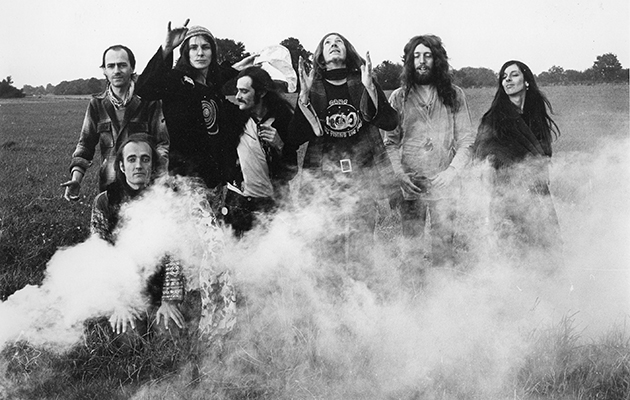By way of tribute to Daevid Allen, whose death was confirmed earlier today, we thought we'd post John Lewis' Gong feature from Uncut, issue 149. Featuring an extensive interview with Allen, as well as other key players in the Gong story, it's a predictably whimsical, meandering trip through A...
The performance was enough to earn the first of several John Peel sessions and an extensive UK tour the following autumn; it was also enough to impress Simon Draper at Virgin Records, who quickly signed the band. “They really put out the red carpet for us and, having toured France so thoroughly, it was difficult to turn down a UK contract. The band was hot, we were all playing at our peak.”
Unfortunately, Virgin hadn’t taken into account the fact that Gong were already signed to a French free-jazz label called BYG Actuel. “For years, all our royalties disappeared down through this black hole created by conflict between these two companies,” says Allen.
After an 18-month furlough – when Allen and Smyth retreated to Majorca to raise their two young children – Gong released their first proper Virgin release in 1973: Flying Teapot, the first in the “Radio Gnome Trilogy”. By now, Allen’s complex, sci-fi mythology was in full swing. The songs told a loose, rambling tale about the protagonist, Zero The Hero, who worships flying teapots and receives messages from the Planet Gong via a magic earring. The band adopted pseudonyms – Allen was “Dingo Virgin”, Smyth “Shakti Yoni”, Didier Malherbe “Bloomdido Bad De Grass”, keyboard player Tim Blake “Hi T Moonweed The Favourite” and new guitarist Steve Hillage “The Submarine Captain”.
“I joined Gong during Flying Teapot,” says Hillage. “I’d been playing with my own band in Canterbury, Khan, and then joined the Kevin Ayers band to tour France. That’s where I first came across Gong. I was already aware of Daevid’s work in Soft Machine but, when I first saw Gong live, I thought, fucking hell, I need to be a part of this. It was the most psychedelic sound I’d ever heard in my life.”
https://www.youtube.com/watch?v=19dikPd-MCE
By the next two albums in the trilogy, Angel’s Egg (also 1973) and You (1974), the band had expanded to feature drummer Pierre Moerlen and bassist Mike Howlett. “I think that was Gong’s creative peak,” says Hillage. “You had this fantastic mix of influences. Pierre was from a classical background, and was also interested in Balinese Gamelan orchestras. Didier had a bebop connection, but is also very interested in Indian music. Mike was into funk and stuff like Weather Report. I was into Hendrix and The Beatles; Daevid loved free jazz and beat poetry. Somehow all these disparate elements seemed to fit together and this amazing force flowed through us all, and, live, our improvisations were almost telepathic.
“But,” continues Hillage, “there was such an incredible energy there that we knew it couldn’t last, and it was the beginning of the end. We ended up losing the house in France because the landlord needed to sell it. Virgin helped us relocate to a farmhouse in Oxfordshire – it was a similar setup, but the magic and exoticism was lost.”
“By this time we were getting indulged,” says Allen. “When you get managers coming in with suitcases full of cocaine, and ludicrous expenditure on stuff you just don’t need – all of it on your account, of course! – a warning light goes on in your head. You need to sabotage things.”



